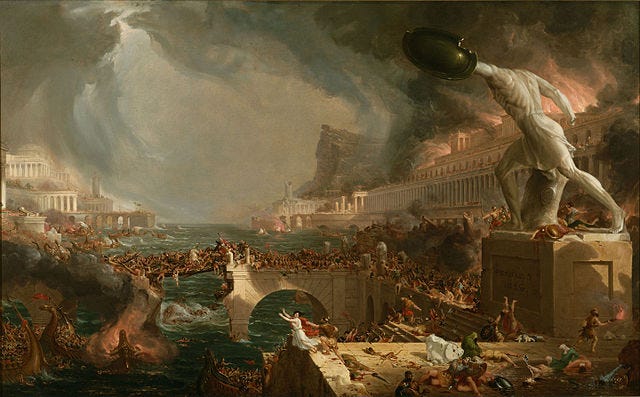We Must Outcompete the Anti-Politics Meme That Holds Back Good Governance
A lot of people don’t know what the word “politics” means. They might be able to tenuously make one up on the spot if asked, but they otherwise walk around without a stable, coherent concept. Further, they are unaware of this state of things, especially if they consider themselves intelligent. This is more destructive than it might seem.
They don’t use “politics” to refer to the science of government, or the art of designing rules for society and its sub-societies. Nothing about statecraft, nothing about public administration. Certainly nothing about the affairs of the polis.
When they use the word “politics,” they use it as a synonym for the many forms of “bad.” It is the empty vessel into which they pour their complaints about almost anything, no matter their political affiliation. “Politics” is nothing in particular, except for whatever bad thing someone witnesses in society.
“Political correctness.” Bad.
“Everything is so political nowadays.” Bad.
“Office politics.” Bad.
“I don’t want to make this political.” Bad.
“That’s a political statement.” Bad.
“Politician.” Bad.
In each case above (in addition to an unlimited number of others), “politics” vaguely means “people acting in a bad way, in a way that will cause upset, or in a way that makes things uncomfortable or hostile.” Of course, sometimes things need to be upset, and you can’t always avoid conflict. But why does “politics” bear this semantic load, and why is this conflated with the actual science of government?
This particular usage of politics—a word that is applied almost exclusively to upset, grievance, and vice—is a powerful meme that has infected most people. It curdles their capacity to think about the field properly (i.e., it makes them dumb with regard to politics), and contributes to the common disdain for government and its stewards: the politicians.
The anti-politics meme1 has two broad consequences: (1) good and superlative people tend to stay away from politics and never look into its proper form2, and (2) the public doesn’t actually know how to tell a good politician from a bad one, and they certainly don’t know what an ideal one looks like.
Many people’s ideas about politics are so inexact, nebulous, and terminally swamped with negative connotation that they are rendered useless at best if your standard of judgment is having a good, self-ruling citizenry.
They are under the unconscious control of a meme that prevents them from even understanding what “good politics” are. Their whole cognitive architecture doesn’t merely reject the idea of “good politics,” it treats the concept as a category error and a contradiction in terms. Why? Because “politics” isn’t a thing in its own right that can be many degrees of good or bad—it’s whatever is going wrong.
The anti-politics meme is one of the most stubborn, corrosive forces in our culture. It’s a parasite that the hosts don’t even know is there. And it contributes to the deterioration of society’s central coordinating mechanisms and the liquidation of its dearest social technologies.3
But politics—the science of government and all that entails—can be beautiful.
It is beautiful in the same manner and for the same reason as the human mind itself. The great legislator and the efficient politician are the cornerstones of any great society. Good law precedes human flourishing.
I would even say that one of the root essences of humanity is politics, our political nature. Like us, it is imperfect. But properly conceived, it can be perpetually improved. What is more wonderfully human than to err and course correct until you fly among the stars?
But all of this is lost in the face of the anti-politics meme. It blinds people to the possibility of politics, falsely paints it as an enemy, and causes the good, the courageous, and the genius to withhold their talents from the foundation of our society.
I am almost unable to communicate how profoundly I reject the anti-politics meme. But I’ll end this essay with some ways to check if it has snaked its tendrils into your mind:
Can you explain some instances, with reasonable detail, of excellent politics? Of the best politics? How about glorious politics? Do you have to grasp at straws?
Ask yourself “What is politics?” Don’t just accept what immediately jumps into your mind. Think about how you use the word, and what it refers to exactly when you use it.
The anti-politics meme cannot be killed. It can only be outcompeted for a time. Consider this the crack of my starting gun.

For reference, a “meme” is an element of a culture or system of behavior that’s passed from one individual to another, usually by imitation. This can be an idea, or a cat pic.
In this way the meme is a self-fulfilling prophecy. People assume politicians are bad, which tends to decrease the average goodness of the people who enter politics and increase the average badness. Rinse and repeat.
Robert Conquest’s third law of politics is almost true: “The simplest way to explain the behavior of any bureaucratic organization is to assume that it is controlled by a cabal of its enemies.”


Damn good writing. I love how you champion the notion of politics being a healthy phenomenon. "I would even say that one of the root essences of humanity is politics, our political nature. Like us, it is imperfect. But properly conceived, it can be perpetually improved. What is more wonderfully human than to err and course correct until you fly among the stars?" Incredible.